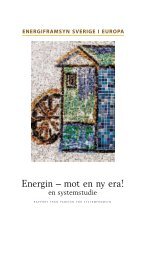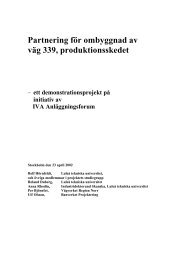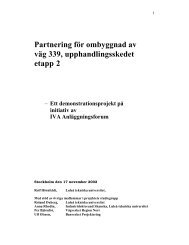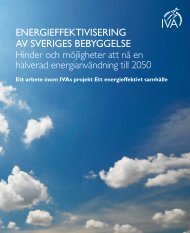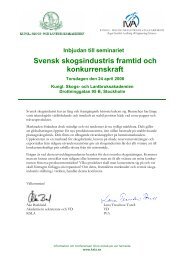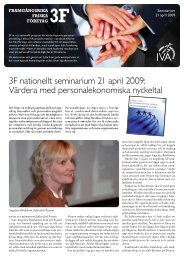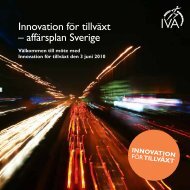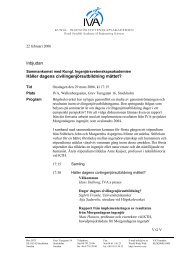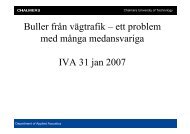Annual Report 2008 - IVA
Annual Report 2008 - IVA
Annual Report 2008 - IVA
You also want an ePaper? Increase the reach of your titles
YUMPU automatically turns print PDFs into web optimized ePapers that Google loves.
tomas kåberger, swedish energy agency:<br />
huge potential to cut energy costs<br />
Tomas Kåberger has been involved in energy issues of an industrial and<br />
financial nature for many years, as a scientist, but also within the bioenergy<br />
industry. He has been Director General of the Swedish Energy Agency since 1<br />
March <strong>2008</strong>.<br />
The swedish energy Agency supports a<br />
number of large projects and programmes<br />
to improve efficiency in energy consumption.<br />
Among other things, the agency is<br />
co-financing ivA’s energy crossroads, a<br />
project to develop strategies for sweden’s<br />
energy system in a new climatic situation.<br />
Tomas kåberger believes that sweden<br />
needs to produce more electricity and<br />
heat from renewable energy and at the<br />
same time work towards improving energy<br />
efficiency. investing to save energy cuts<br />
costs.<br />
“in the swedish energy Agency’s programme<br />
for energy efficiency in electricity<br />
intensive industries, companies are investing<br />
sek 1 billion to cut electricity consumption<br />
by one terawatt-hour per year.<br />
This is just one fifth of the investment to<br />
produce the same amount of energy with<br />
new nuclear or wind power. The potential<br />
is huge, especially for the housing sector.<br />
Tomas kåberger hopes that sweden<br />
can take the initiative at the political level<br />
as well. in 2009 sweden will take over<br />
the eu Presidency and the same year, the<br />
un’s climate conference will take place in<br />
copenhagen.<br />
“sweden has traditions and expertise<br />
that set us apart from other countries, including<br />
those within the eu. The bioenergy<br />
field is one example; sweden has been<br />
working for a long time with bi-products<br />
from forests and agriculture, while elsewhere<br />
in the eu, when they talk about<br />
more bioenergy they are usually referring<br />
»Sweden has traditions<br />
and expertise that set<br />
us apart from other<br />
countries«<br />
»<strong>IVA</strong> can be of benefit,<br />
with its ability to<br />
help create industrial<br />
constellations through<br />
its networks«<br />
to specially-cultivated crops. it’s important<br />
that sweden’s representatives manage to<br />
explain the strategy of our forest industry.<br />
Taxes on fossil fuels helped create a market<br />
for bioenergy in sweden earlier than in<br />
other countries. competition, rather than<br />
subsidies, encouraged companies to find<br />
bi-products instead of using energy crops,”<br />
says Tomas kåberger.<br />
“now we have the opportunity to develop<br />
wind and solar energy as well. Perhaps<br />
we can be even more successful in<br />
developing our manufacturing industries<br />
when the demand is growing globally.”<br />
a possible future scenario that Tomas<br />
kåberger sees is one in which sweden<br />
21<br />
expands, for example, its wind power production<br />
significantly and then sells energy<br />
to countries on the continent.<br />
“This would lower the price of electricity<br />
in sweden, provide climate benefits and<br />
at the same time be a boost for excellent<br />
swedish companies such as skf and ABB.<br />
But we need a combination of researchmarket-industry<br />
to bring about this development.<br />
only when all of these interact<br />
can positive things really start to happen.”<br />
Tomas kåberger believes sweden is in a<br />
strong position to take the lead in industrialisation<br />
projects within the energy sector.<br />
industrialisation opportunities are, according<br />
to Tomas kåberger, a key issue for<br />
successful development of the energy sector<br />
– and there is a central role for ivA to<br />
play here.<br />
“sweden has excellent researchers and<br />
technology suppliers within the energy<br />
sector, but we have not been as successful<br />
at exploiting this for industrialisation. This is<br />
where i believe ivA can be of benefit, with<br />
its ability to help create industrial constellations<br />
through its networks.”<br />
tomas kåberger also emphasises the<br />
importance of ivA involving professionals<br />
working in industry.<br />
“if ivA is to be able to make concrete<br />
contributions in the industrialisation of<br />
new technology, professionals working in<br />
industry need to be involved. in division<br />
iii: Building and construction, where i’m<br />
a member, we have worked hard to find<br />
themes for our meetings that can attract<br />
people working in industry to take the<br />
time to participate. we have also managed<br />
to raise the level of attendance at our<br />
meetings.”



